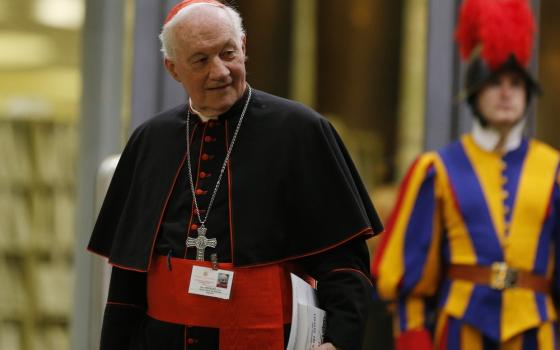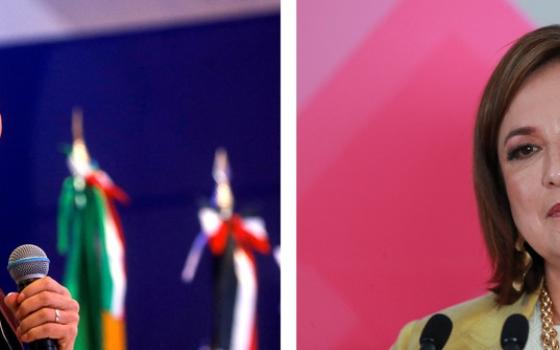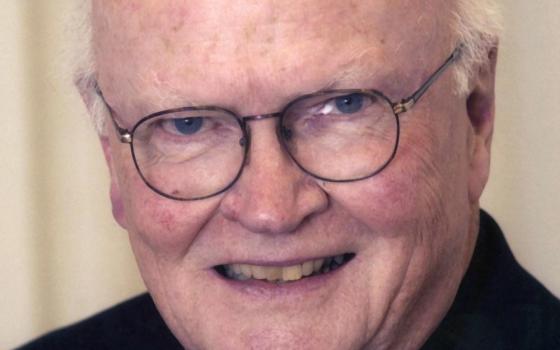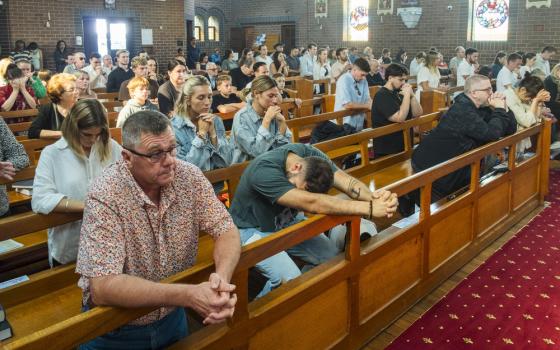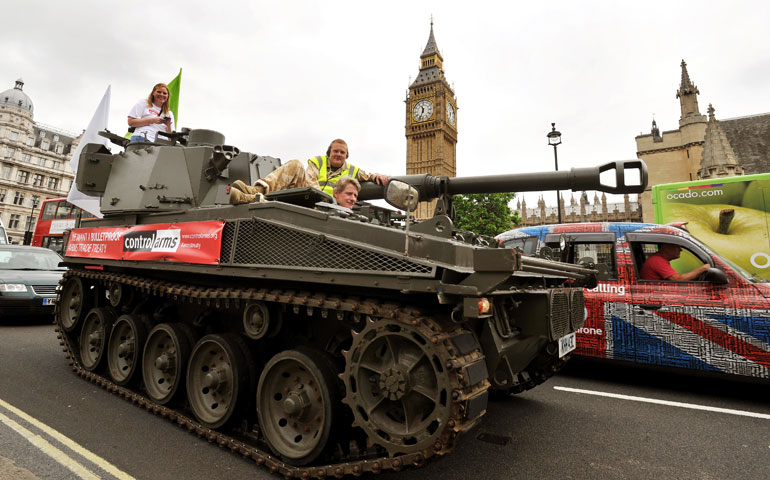
While the U.S. grapples with reform of its domestic gun policies, advocates of arms control worldwide have been gearing up for the restart of negotiations this month on a comprehensive United Nations-sponsored treaty to regulate international trade in conventional weapons.
Last December, the U.N. General Assembly voted overwhelmingly in favor of resuming treaty talks after a drafting conference in July 2012 collapsed because the U.S., followed by several other arms-producing countries, requested more time.
Scheduled for mid-March, the U.N. diplomatic conference on the Arms Trade Treaty represents yet another round in a crucial fight over the massive supply of weapons flooding the world.
The treaty's many backers -- a broad-based coalition of human rights groups, religious and nongovernmental organizations, as well as many states -- say a legally binding international agreement is essential for reducing the human suffering caused by the multibillion-dollar global trade in illicit arms.
"There are more laws regulating international trade in bananas than conventional weapons," said Fr. Paul Lansu, a senior official at Pax Christi International, which strongly supports the treaty. While some regions and countries, the U.S. among them, impose fairly rigorous controls on their arms trade, in large areas of the world, guns flow freely.
According to a 2011 Oxfam report, as of 2010, only 47 percent of the 154 countries reporting to the U.N. on their arms management practices had basic controls on the export of small arms and light weapons, a subset of conventional weapons.
The gaps in regulation have created a "free-for-all market" that allows states, arms manufacturers and dealers to transfer weapons to regimes or "murky representatives of armed groups with little or no oversight and even less legal obligation not to have those sales contribute to human rights violations and massacres," said Adotei Akwei of Amnesty International USA.
2,000 killed daily
Nearly 2,000 people around the world die daily from armed violence and that tally only partially describes the havoc caused from unregulated guns, say arms control advocates. Illicit weapons trafficking fuels conflicts, poverty, child soldiering, gender-based violence, and a culture of impunity. It is not the only cause of these conditions, but an "incredible facilitator," Akwei noted.
As currently drafted, the Arms Trade Treaty represents an expansion in the U.N.'s efforts to minimize the hazards of the global arms trade. Previous initiatives focused on small arms. The new treaty would regulate seven categories of conventional weapons, including battle tanks and warships. It would obligate states to establish national controls for the trade and transfer of these weapons and to apply internationally agreed-upon assessments -- akin to a universal background check -- before authorizing arms exports.
The hope, Akwei says, is to get governments to be more accountable for the actions of their ministries of defense and to reduce the space in which the illicit arms trade operates. "This is not going to be the silver bullet," he added. "But right now there is nothing to cause a person to think twice about selling a weapon to militants in Uganda or the Democratic Republic of Congo. … Even if you could trace the weapons, chances are there would be nothing illegal about the transaction because there is no law about this."
Last summer, several hundred religious leaders from 46 countries, including three Catholic cardinals and dozens of bishops, signed an interfaith declaration in support of the treaty that was presented at the start of July 2-27 conference in New York. Many of the signatories were from the global South, where the devastating effects of the illicit arms trade are widely felt.
Speaking via video, South Sudanese Protestant Bishop Elias Taban told participants at the July conference that small arms and ammunitions posed more of a threat to his communities than nuclear weapons, which are subject to treaties. A former child soldier, Taban is now president of the Sudan Evangelical Alliance.
Taban told The Christian Post, a nondenominational newspaper based in Washington, D.C., that small arms enabled one tribe in 2011 to kill "300 people just in a day's attack. And this year, another tribe retaliated and killed 600 people in another attack. … Even in 40 years of life of war in Southern Sudan, I have never seen killing in a day like that."
Akwei and Taban are part of a global coalition of civil society groups pushing for a legally binding, humanitarian-focused treaty. Its main objective "must be to safeguard human life and to build a world more respectful of human dignity, not just to regulate the illicit arms trade," the Vatican wrote in a 2011 statement written for the U.N.'s third Preparatory Committee on the Arms Trade Treaty. An early endorser of the treaty, the Vatican has called for including victim assistance and compensation in the convention.
Complicating such aspirations are the United States' conflicted views on arms regulation. The world's largest arms supplier, providing more than 40 percent of the global arsenal, the U.S. has relatively robust requirements for its weapons export. Many treaty supporters say the treaty is nothing more than an attempt to bring the rest of the world up to this "gold standard."
The U.S., however, has typically resisted efforts at international regulation, regarding them as an infringement on U.S. gun ownership.
Reversing that position, the Obama administration embraced the treaty as an important national security tool in a world where, it believes, America's greatest threats increasingly come from nonstate actors armed with illegally obtained weapons.
But domestic opposition has been fierce and relentless. Although the treaty exclusively regulates the international arms trade, the National Rifle Association has described it as an intrusive attempt by the U.N. and "the global gun eradication movement" to eliminate "Second Amendment freedoms" for Americans.
The gun lobbying group, which has nongovernmental organization status in order to monitor disarmament efforts at the U.N., has repeatedly objected to including small arms and light weapons (what the NRA calls "civilian weapons") in the convention's scope. Additionally, they say the treaty's requirements for record-keeping will lead to a national registry of U.S. guns, which the NRA opposes, and impose cumbersome costs on U.S. businesses.
Speaking at the July conference, NRA Executive Vice President Wayne LaPierre warned that keeping of "civilian firearms ownership" in the treaty would meet "with the NRA's greatest force of opposition."
U.S. legislators also weighed in during the treaty talks. A letter from 130 U.S. lawmakers to President Barack Obama and Hillary Clinton, then secretary of state, detailed objections to a treaty that is "likely to pose significant threats to our national security, foreign policy, and economic interests as well as our constitutional rights."
The letter said the U.S. must not endorse a treaty that infringes on the individual right to self-defense, or hinders the United States' "strategic, legal and moral commitment" to provide arms to allies such as Taiwan or Israel, or subjects the U.S. to "the jurisdiction of the International Criminal Court."
A more conciliatory missive from 52 U.S. senators recognized the need for regulating the global arms trade, but, like the House letter, called for excluding small arms and ammunition from the treaty's scope.
In November, 70 U.S. lawmakers endorsed an anti-Arms Trade Treaty resolution. The bill decreed Obama should not sign the treaty and that if he did, the Senate should not ratify it.
Reassurances and 'redlines'
Amid the criticisms, the U.S. State Department issued reassurances the treaty did not "handicap" Second Amendment rights and posted on its website a list of U.S. "redlines" for the negotiations. While the NRA credits itself with "killing" the July talks, treaty supporters attribute the U.S. withdrawal to Obama's reluctance to take on a hot-button issue during his re-election campaign. Indeed, the Obama administration has consistently supported resumption of the talks.
"We seek a treaty that fights illicit arms trafficking and proliferation, protects the sovereign right of states to conduct legitimate arms trade, and meets the concerns that we have articulated throughout," a U.S. official told Reuters in late December. "In particular, we will not accept any treaty that infringes on the constitutional rights of U.S. citizens to bear arms."
Eric Sapp, executive director of the American Values Network, calls the NRA's criticism of the treaty "a complete red herring." The treaty's charter "explicitly states it cannot violate the Second Amendment of the U.S. Constitution," he said, adding that much of what is in the July treaty is based on U.S. law and practice. "The treaty is bringing the rest of the world to where we are," he said.
The American Values Network is coordinating some of the faith-based efforts in support of the treaty. Sapp believes ratification is very much in the strategic interest of the U.S., whose greatest threats will come from destabilized states. Sapp says it is also morally right. "This is a treaty where thousands of lives are at stake and those stakes are way too high to let a partisan group determine outcome," he said.
As the March conference approaches, arms control campaigners are lobbying for a "bulletproof" treaty, one that covers ammunition as well as small arms. Both are essential for an effective treaty, they say. Small arms account for most civilian deaths in conflicts around the world, and it is ammunition that revitalizes arsenals of old weapons from past wars.
"Guns don't kill people. Bullets do," Sapp says.
Treaty supporters say they are cautiously optimistic about the March conference. Most U.N. states, including the U.S., want a treaty. The question, of course, is what kind. Major arms-producing states could render the convention meaningless with loopholes and provisions that are voluntary rather than mandatory. The consensus requirement on the negotiation means any U.N. member state can veto the treaty. Should that happen U.N. delegations can put it to a vote at the 193-nation General Assembly where it is likely to receive the required two-thirds majority.
[Claire Schaeffer-Duffy is a longtime contributor to NCR based in Worcester, Mass.]

